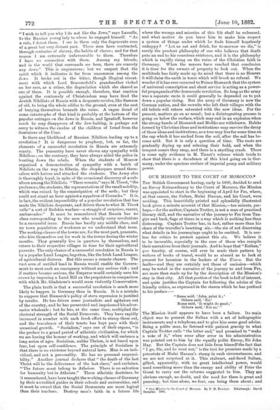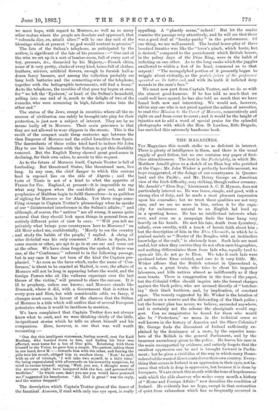OUR MISSION TO THE COURT OF MOROCCO.* distressing. Captain Trotter
has, in fact, rather more than his share of the traveller's besetting sin,—the sin of not discerning what details in his journeyings ought to be omitted. It is use- less for critics to protest against this sin. We believe it to be incurable, especially in the case of those who compile their narratives from their journals. And to hope that "Eotheia,"
qua brevity, of course, will ever be made their pattern by writers- of books of travel, would be as absurd as to look at present for laconism in the leaders of the Times. But the faults—and they are certainly not those of omission—which
may be noted in the narrative of the journey to and from Fez, are more than made up for by the description of the Mission's stay in that city. All that portion of the book is full of interest, and quite justifies the Captain for following the advice of the friendly critics, as expressed in the stanza which he has prefixed to his preface :—
" Some said, 'John, print it ; ' Others said, No.'
Some said, It might do good ; ' Others said, Nut so.'"
The Mission itself appears to have been a failure. Its main object was to present the Sultan with a set of heliographic instruments and a telephone, and to give him some good adviee. Being a polite man, he listened with patient gravity to what Captain Trotter calls "the bitter end," and promised to "make a note of it," when error after error in his administration was pointed out to him by the equally polite Envoy, Sir John Hay. But the Captain does not hide from himself the feet that "I go, Sir, and he went not," is the text for promises made by a potentate of Mnlai Hassan's stamp in such circumstances, and we are not surprised at it. . This stalwart, sad-faced Sultan, gifted, apparently, with no great intellectual power, would
need something more than the energy and ability of Peter the Great to carry out the reforms suggested to him. They are
obvious enough, no doubt, and the need for them is great and pressing; but time alone, we fear, can bring them about; and
• Out Mission to the Curt of Morocco. By P. D. Trotter. Edinburgh: David Douglas. 188l.
THE British Government having, early in 1880, decided to send an Envoy Extraordinary to the Court of Morocco, the Mission was appointed to start in the beginning of April for Fez, where, at that season, the Sultan, Mulai Hassan, and his Court, were residing. This beautifully printed and splendidly illustrated book gives a minute account of that Mission,—too minute, per- haps,—for the author, Captain Trotter, is not a man of practised literary skill, and the narrative of the journey to Fez from Tan- gier and back, flags at times in a way which is nothing less than
we must hope, with regard to Morocco, as well as so many other realms where the people are desolate and oppressed, that " volvenda dies, en, attnlit nitro !" will be one day said of the blessings which at present " no.god would venturd to promise."
The fate of the Sultan's telephone, as anticipated by the author, is significant of the fate of his promises :—" One end of the wire we set up in a sort of lumber-room, full of every sort of toy, presents, Sze., discarded by his Majesty,—French china, some of it very pretty, clocks of every kind, boxes full of clothes, feathers, mirrors, artificial flowers, enough to furnish half-a- dozen fancy bazaars, and among the collection probably ere long both batteries and the connecting-wire of the telephone, together with the heliographic instruments, will find a home."
As to the telephone, the troubles of that poor toy began at once, for "we left the Eyebrow,' or head of the Sultan's household, yelling into one end of it, much to the delight of two of the eunuchs, who were screaming in high, falsetto notes into the other end."
The status of the Jews, except in countries where all the re- sources of civilisation can safely be brought into play for their protection, is just now a subject of interest. They are by no means badly off in Morocco. Their main grievance is that they are not allowed to wear slippers in the streets. This is the result of the compact made three centuries ago between the then Emperor of Morocco and the exiled Israelites from Spain.
The descendants of these exiles tried hard to induce Sir John Hay to use his influence with the Sultan to get this disability removed. But the English Envoy showed great good-sense in declining, for their own sakes, to accede to this request.
As to the future of Morocco itself, Captain Trotter is full of foreboding. But threatened States, like threatened men, live long. In any case, the chief danger to which this curious land is exposed lies on the side of Algeria ; and the taste of Tunis is not of a kind to whet the appetite of France for Fez. England, at present—it is impossible to say what may happen when the coal-fields give out, and the prophecies of Malthus begin to fulfil themselves—is as guiltless of sighing for Morocco as for Alaska. Yet there rings some- thing strange in Captain Trotter's phraseology when he speaks of our "disinterested interference in the Sultan's affairs ; " and although, of course, the " natives" are all wrong, it seems quite natural that they should look upon things in general from an entirely different point of view to ours. "'Will you tell me privately what brings your countrymen here to Morocco ? ' an old Moor asked me, confidentially. 'Merely to see the country and study the habits of the people,' I replied. A shrug of utter disbelief was his only comment." Affairs in Spain, for some reason or other, are apt to go in at one ear and come out at the other. We have clean forgotten the upshot, if there was one, of the " Conference" referred to in the following passage, but in any case it has not been of the kind the Captain pro- phesied. "As soon as the farce which, under the name of Con- ference,' is about to be enacted at Madrid, is over, the affairs of Morocco will not be long in appearing before the world, and the foreign Powers who sit like vultures expectant over the last throes of the victim," will proceed to share the carcase. It is ill to prophesy, unless one knows; and Morocco stands like Denmark, where it did, with a Government that is rotten in every pore and fibre, but with considerable odds, we fancy, if changes must come, in favour of the chances that the Sultan of Morocco is a title which will outlive that of several European potentates whom it would be invidious to mention.
We have complained that Captain Trotter does not always blow what to omit, and we were thinking chiefly of the little, insignificant stories which he tells us about himself and his companions. Here, however, is one that was well worth
recounting :—
"One day this intelligent statesman, feeling unwell, sent for Kaid Maclean, who harried down to him, and finding his liver was affected, went home for a box of blue pills. Returning with them himself to the Vizier, he gave him a couple. The patient, taking them in one hand, drew M— towards him with the other, and forcing the pills into his mouth, obliged him to swallow them. Now,' he said, with an air of triumph, will take twa myself, in a little time.' On being expostulated with afterwards on his unworthy suspicion, he tried to excuse himself, saying, Well, you see I thought some of the servants might have tampered with the box, and poisoned the medicine." In which ease, don't you see you would have poisoned me ?' suggested his benefactor. 'Ab, God is great !' was the reply, and the matter dropped."
The description which Captain Trotter gives of the dance of the fanatical Aissowa, if read with only 'one eye open, is really appalling. A "ghastly scene," indeed ! But let the reader examine the passage very, attentively, and he will see that there was a good deal of " hanky-panky " in the performance. Of one thing, we are well assured. The brutal horse-play of these besotted fanatics was like the "lover's pinch, which hurts, but is desired," compared to the punishment which British boxers, in the palmy days of the Prize Ring, were in the habit of inflicting on one other. As to the long snake which the juggler swallowed to within a foot of its head, commend us to that serpent ! "The unengulphed portion of it presently began to wriggle about violently, as the gastric juices of the pmformer operated on its latter end, and with its teeth it inflicted deep wounds in the man's face."
We must now part from Captain Trotter, and we do so with the utmost good-humour. If he has told us much that we could well have spared, he has also told us much that we have found both new and interesting. We would not, however, advise any one who is not proof against the action of narcotics, to read Our Mission to the Court of Morocco, consecutively and right on and from cover to cover ; and it would be the height of injustice not to add a word of special praise for the splendid photographs with which the Hon. D. Lawless, Rifle Brigade, has enriched this extremely handsome book.





































 Previous page
Previous page